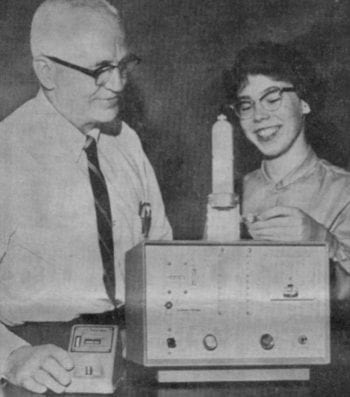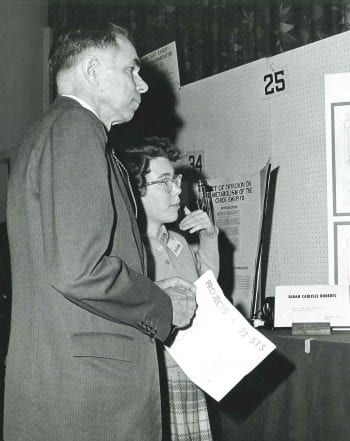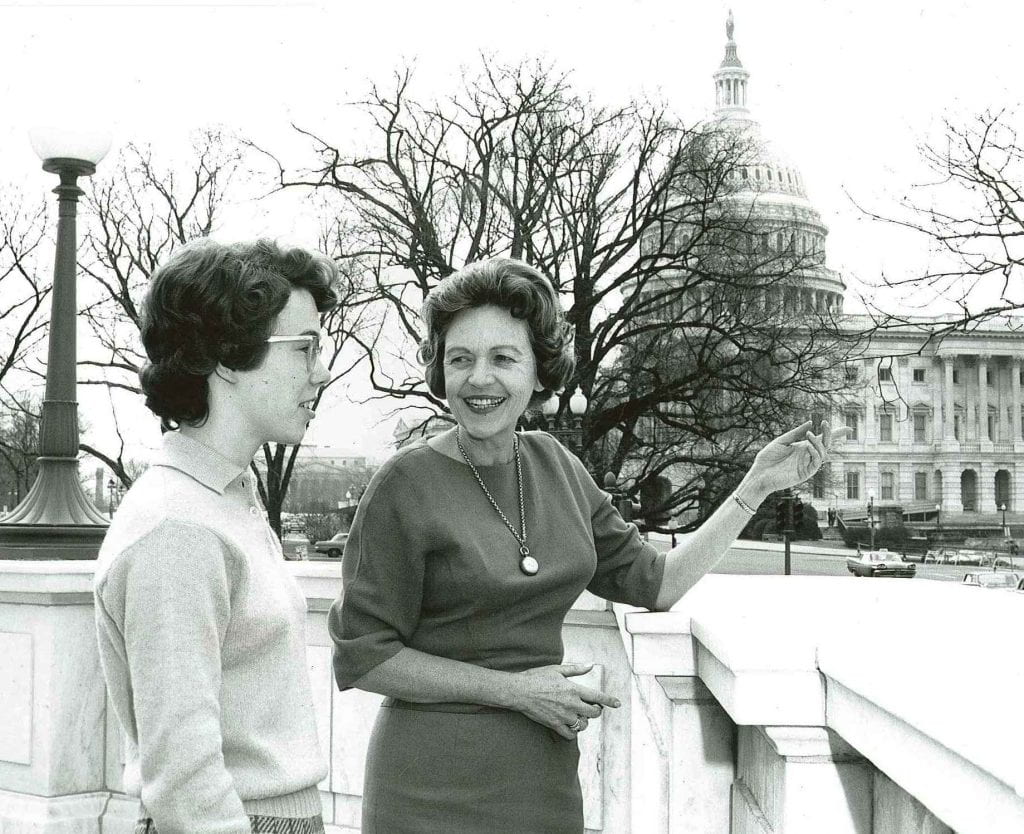Nowadays Sally Elgin would probably be referred to as gifted or talented. But in the 1950s, a really smart girl was obnoxious or a nerd.
“I come from a long line of nerds and it’s not always a good social position to be in,” explains Elgin, the Viktor Hamburger Professor of Arts & Sciences at Washington University in St. Louis, and founder of the forerunner to the university’s Institute for School Partnership.

She will retire at the end of the academic year, and is reflecting on the lessons she has learned during her life in science.
“I have seen so many changes in my 40 plus years – not just advances in biology but advances in science education and higher education efforts to recruit scientists from all backgrounds,” Elgin says.
Growing up in Salem, Oregon, Elgin knew early on that she wanted to be a scientist. In fourth-grade she started a zoo that featured insect in jars. But there wasn’t much science curriculum in her grade school. There were no lab facilities. Any curriculum was very much textbook driven. In junior high, science was an elective. Her mother wanted her to take orchestra, instead.
“She was very much into music,” Elgin says. “And there was only the one elective. My mom talked with the science teacher, and he said, ‘Well we don’t do very much so let her read the textbook. I ended up taking orchestra.”
But in 1957, the launch of Soviet Union satellite Sputnik changed her life and science education in the United States. Alarmed that American students were falling behind, the government tripled funding for the National Science Foundation to improve science education. Federal money flowed into schools for curriculum reform, teacher workshops and more. Elgin also benefited from having great high school teachers – teachers that encouraged her interest in science.
Mr. Birrell was my savior
Elgin is particularly grateful to her 11th grade chemistry teacher George Birrell. He taught “CBA Chemistry,” and was taking a weekly chemistry class in the evening at Reed College in Portland, Oregon. Birrell took a group of his high school students with him – a group Elgin was a part of. In fact, she was the only girl. He also encouraged her parents to let her attend a summer program for mathematics at UCLA. It was with his help that she also conducted her first experiment. She studied radioactive fallout in Oregon rainwater. The year was 1961. It garnered a lot of attention, and was published in the local newspaper, the Capital Journal.

“During that time the Chinese and Soviet Union were testing nuclear weapons above ground,” she says. “It rains a lot in Oregon, so I got a couple of old pie plates from my mother and every time they set off an explosion I would start collecting rainwater. I was able to collect data to show the change in the level of radioactivity when the cloud arrived after crossing the Pacific Ocean. It was really exciting.”
In her senior year in 1963, Birrell encouraged Elgin to enter what was then called the Westinghouse Science Talent Search – a competition for high school seniors of original research projects. She was a finalist and traveled to Washington, D.C.
“Birrell was my savior,” she says of her high school chemistry teacher. “I was actually thrown out of several classes for asking too many questions. They said I was being disruptive.”
Birrell set up a schedule so that Elgin could work on her Westinghouse project in the lab three days a week, and attend classes the other two days.
The conversation didn’t surprise me
After high school, Elgin earned a bachelor’s degree in chemistry from Pomona College in Claremont, California, in 1967. But it wasn’t an easy time for women in the male-dominated world of science.
The summer before her freshman year she attended a faculty dinner where male professors debated whether it was worthwhile to educate women in science. The chemistry professor who argued ‘no’ turned out to be her advisor.
“The conversation didn’t surprise me,” she says. “I had been getting that for a long time. In high school, when the mom of one of my classmates came in and brought our study group snacks, she would invariably say that it was strange for a girl to be interested in science. It happened all the time. I got used to it.”
The lesson learned: be prepared to walk into a classroom and be one of a kind.
40 years later, the speaker had forgotten – I remembered
Elgin attended graduate school at the California Institute of Technology (Caltech), and earned a doctorate in biochemistry from there in 1972. During an interview for a postdoctoral fellowship, a board member inquired why a married woman would apply for the position given that she would want to drop out when she had children.
Forty years later she ran into the man and reminded him of the exchange. He had no recollection of it, and was appalled by the suggestion that he had uttered those words. She says it illustrated two things: that times had changed, and that the comment was of no importance to him.
“Forty years later, the speaker had forgotten, but I remembered,” she says.
The lesson learned: she realized then the power of words.
“Be careful what you say to the young people around you. I tell my students that they’re starting to be mentors also, and to think about how a word of encouragement or discouragement effects a student,” she says.
Think in terms of grants and not bake sales
Elgin joined the Department of Biology at WashU in 1981 and became a full professor in 1984. She was installed as the inaugural Viktor Hamburger Distinguished Professor in Arts & Sciences in 2006. She is a professor of biology and of education, both in Arts & Sciences, and of genetics and biochemistry, in the School of Medicine.
In the late 1980s, she founded the Office of Science Outreach, which initially started as an informal science education partnership with her children’s School District in University City. It brought WashU science faculty into schools to provide students with interactive environmental science and genetics projects. That effort evolved into its present-day form – the Institute for School Partnership (ISP), led by Victoria L. May.
“My greatest gift to U City was to support them in thinking in terms of grants and not bake sales,” she explains, a strategy they had been developing with success.
Elgin officially stepped down from the partnership in 2004. Since its inception nearly 30 years ago, it has grown exponentially. Its programs now reach more than 2,500 teachers, 400 administrators and 100,000 students each year.
She gives a lot of credit for its progress and success to May.
“Vicki has exceptional organizational and people skills,” Elgin says. “She is a master at connecting with all the different levels at the school districts. She can talk to teachers and administrators. She can do it all! She has been able to draw in WashU faculty, gain the trust of the community and funders, while maintaining a quality product.”
May easily returns the compliment calling Elgin a true pioneer, not only in her research, but in her creative approach and dedication to teaching.
“Sally’s work transformed the science experience for many students,” says May. “Thanks to her foresight, the ISP flourished, becoming one of the nation’s largest initiatives to improve the quality of science and math education in the public schools. None of this would exist if it hadn’t been for Sally’s efforts decades ago to implement a novel ‘hands-on’ science curriculum in her children’s school district.”
In her retirement, Elgin plans to relocate to Berkeley, California. She is looking into two possibilities for volunteer science education work, and with a new granddaughter, should soon be able to build contacts with the school district.
As her academic career winds down, Elgin continues to amass awards. It was recently announced that she will receive Washington University’s Arthur Holly Compton Faculty Achievement Award. The award celebrates individuals who have creatively and diligently to discover and disseminate new knowledge that brings great benefit to society. In addition, Elgin was selected to receive the University’s Gerry and Bob Virgil Ethic of Service Award this year. The award recognizes a member of the WashU community who exemplifies a character of service and contribution to the St. Louis region.
April 2018 | by, Myra Lopez
